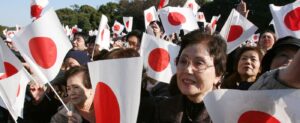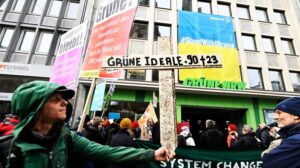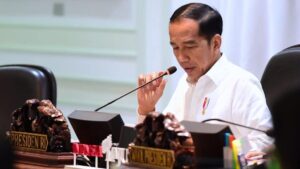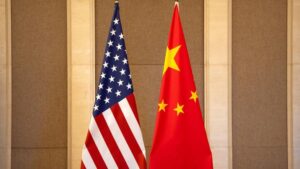Overcoming Post-Democratic Phenomenon in Indonesia After Pandemic COVID-19

Illustration of domenstrations in Indonesia. Photo: Kumparan/Ananda Gabriel
The COVID-19 pandemic has shown flaws of democracy in Indonesia. If we dig deeper into democracy that occurs in Indonesia, it leads to the post-democracy phenomenon which, according to Collin Crouch (2004), means “a post-democratic society is one that continues to have and to use all institutions of democracy, but in which they increasingly become a formal shell. The energy and innovative drive pass away from democratic arena and into small circles of a politico-economic elite.”. The post-democracy phenomenon can also be seen in the deterioration of the democracy index in a report from The Economist Intelligence Unit (EIU) Indonesia—which shows degradation in 2020 to score 6.3 with ranking 64 in the world (EIU, 2020). This year, Indonesia’s democracy index is the lowest in the last fourteen years and categorized as flawed democracy.
Additionally, COVID-19 pandemic also facilitates power centralization under the guise of resolving “crisis” by making regulations unilaterally and in accordance with what the government thinks is “true”. Without hearing the voice of civil society in policy-making, this is the reason why Indonesia is moving towards a post-democracy phenomenon. The event of ratifying Omnibus Law during the pandemic also led to massive demonstrations, but ratification was still carried out as if Parliament of Republic Indonesia (DPR RI) was the only formal institution that shows the existence of democracy in Indonesia. Also, Indonesia still has to face a high number of corruption because of the revision of Corruption Eradication Commission Law (RUU KPK) which was passed in 2019 and aims to weaken KPK and contribute to demonstrations, although in the end it wasn’t heard. Independence of the Constitutional Court as an institution that examines problematic laws still needs to be questioned, seeing Revision of Constitutional Court Law (RUU MK) provides “gift”, extension of term of office and retirement age of constitutional judges which can open opportunities for political gain to the ruling elite. The protection of democracy with state institutions that are only formalities is certainly a reflection of the post-democracy phenomenon in Indonesia.
In this problem, the role of NGOs is needed to support civil society which is the cornerstone of democracy. NGOs became a bridge for the public and government to voice their aspirations and can form a strong democratic civil society through advocacy and reform, so they become a countervailing force to prevent authoritarian regimes. Strong opposition parties also play roles in preventing post-democracy phenomenon that can promote checks and balances in government.
Strengthening Post-Democracy in Revision of KPK Law, Constitutional Court, and Omnibus Law
In Colin Crouch’s book “Post-Democracy”, it is explained that the post-democracy condition has several tendencies. First, community involvement in politics is limited and almost all aspects of political life are determined by elites. Second, there’s a tendency to use populist and post-truth methods in politics. This is because in post-democracy conditions there’s no need to fight for ideas, the most important thing is how to build an image and win people’s emotions with political promises. Third, state institutions have become “servants of the oligarchy”, which ultimately results in low public respect for them. Meanwhile, dimness of democratic norms makes it easy for democracy to trigger political conflicts or to get hijacked by momentary interests of the elite (Crouch, 2004).
Post-Democracy in Impairment KPK
The high level of corruption in Indonesia has resulted in degression in basic democratic principles such as political equality, people’s sovereignty, people’s participation in politics, rule of law and public trust (Daven, 2016). And it happened when the political elite through Parliament have proposed a Bill on Amendments to Law Number 30 of 2002 Concerning Corruption Eradication Commission (RUU KPK) which aims to weaken eradication of corruption which was passed in 2019 by ignoring large demonstrations. As for several points in RUU KPK that weakened KPK, as in Article 1 paragraph (3) RUU KPK shows KPK’s position as an executive body and replaces previous position as an independent corruption eradication agency in exercising its authority as it doesn’t influenced by any power. The entry of KPK as an executive body resulted in intervention by the executive body above it in eradicating corruption in Indonesia. Existence of supervisory board in Article 47 paragraph (1) which is also considered to weaken KPK, this is seen from duties and powers of supervisory board as licensee in terms of investigations, searches and seizures in corruption cases (KPK, 2019). In other words, the role of the supervisory board indirectly determines whether or not permits are granted for the process of investigation, search, and confiscation of evidence of corruption, which can interrupt the continuation of ongoing corruption cases.
With the weakening of KPK, the politico-economic elite are more free to cooperate in carrying out their interests, either committing corruption without fear of being caught by KPK, with notes that the politico-economic elite must have sufficient relations with KPK supervisory board. This case becomes evidence for the existence of a post-democracy phenomenon where ratification of RUU KPK indicates minimum participation of people, and the politico-economic elite holds full power over process and direction of policy objectives. This condition provides an opportunity for corruption practices and deviations in form of interpretations are only in accordance with interests of authorities (LBH Jakarta, 2019).
Post-Democracy in Omnibus Law
Omnibus Law has the meaning of regulating certain specific matters by changing several provisions in many laws so in the legislative body it can be discussed simultaneously and decided in one decision making (Hantoro, 2020). However, creation of Omnibus Law Cipta Kerja in Indonesia was made secretly, quickly, and closed public participation by taking advantage of COVID-19 pandemic. Even though there were massive demonstrations among civil society and also criticism from independent state institutions such as National Human Rights Commission (Komnas HAM), they still couldn’t shake the desire of Parliament and President to pass Omnibus Law Cipta Kerja.
The ratification of Omnibus Law Cipta Kerja is full of oligarchic interests as seen from important actors involved in Omnibus Law task force, work committee, leadership of Parliament of Indonesia, and several related ministries who have direct and indirect relations with mining and dirty energy business in Indonesia. In final draft of Omnibus Law Cipta Kerja with 812 pages, one of articles related to mining, minerals and coal (minerba) that makes it easier for these political elites is there’s a 0% royalty incentive for mineral and coal mining companies that carry out downstreaming and increase added value in page 147. The resulting impact of this article, it causes state to lose revenue from royalties, opens tap for massive exploitation of natural resources, and makes coal companies owned by politicians such as Bakrie family and coal companies they own such as Kaltim Prima Coal and Adaro Indonesia which profits are thought to also flow to families of Thohir-Garibaldi and Erick Thohir as beneficiaries and being able to keep their money for themselves (FRI, 2020). So there’s no doubt that the existence of this regulation makes state institutions have become “servants of the oligarchy” which ultimately results in low public respect for them.
Post-Democracy in Constitutional Court
The Omnibus Law Cipta Kerja and RUU KPK are regulations full of oligarchic and problematic issues. So to cancel this regulation it’s necessary to submit a judicial review to the Constitutional Court of Republic Indonesia. This is in accordance with the authority of the Constitutional Court if a law or a part of it’s proven to be not in line with the constitution, legal product will be canceled by Constitutional Court (MKRI, 2015).
Judging from its authority, the Constitutional Court should becomes hope for democracy, but the fact is independence of Constitutional Court still needs to be questioned seeing that RUU MK provides “reward” for extension of term of office and retirement age of constitutional judges which can open opportunities for political benefits to Constitutional Court the ruling elite. This new provision has also removed Article 59 paragraph (2) which obliges the President and Parliament to follow up on amendments to laws that have been tested. This amendment to Constitutional Court Law is therefore worth assessing as a form of anticipation for petition for judicial review of a number of problematic laws. (Mudhoffir & A’yun, 2020). The existence of Constitutional Court Law can reduce the likelihood of lawsuits against winning a case which is also related to manipulating law and restraint of democracy in the interests of authorities. Even steps such as issuance of a Government Regulation in Lieu of a Law (Perppu) also deadlocked because President Jokowi wants formation of RUU MK, RUU KPK, and Omnibus Law.
The passing of RUU KPK, Omnibus Law, and RUU MK shows democracy in Indonesia is in a post-democracy era. That three laws become a unity that facilitates political elite to achieve their interests by taking advantage of momentum of COVID-19 pandemic so that centralization of power can be done easily because government has authority to make policies unilaterally and according to government it’s “true” without needs for input from public with pretext of getting Indonesia out of this pandemic “crisis” immediately. Also, to get Indonesia out of the government’s version of crisis is to make Omnibus Law which facilitates huge investment, which if these politico-economic elite want to corruptions so that they are not arrested by KPK, it’s also necessary to weaken KPK with RUU KPK. In order for this practice to continue, elites also need constitutional court judges so the public never wins judicial review of Omnibus Law and RUU KPK, and RUU MK. Therefore, to get out of this post-democracy trap, it needs roles from NGOs along with civil society and strengthen opposition parties in carrying out checks and balances. So, the political will of the government can be realized to prevent a post-democracy phenomenon.
Overcoming Post-Democracy After Pandemic
In every crisis there’s always a tendency to strengthen the role of authorities and to restore the crisis, the government can do everything it deems important, including issuing controversial policies coupled with a pandemic will limit space for people to speak up because of prohibition on gathering and so on. Indeed, this situation doesn’t always lead to devastation of democracy, but at least, it will lead to a weakening of democracy due to the tendency of a centralized government and emergence of oligarchs (Noor, 2020). Therefore, civil society cannot wait until COVID-19 pandemic ends and must take action for democratization immediately.
Of course, overcoming the post-democracy phenomenon with dominating politico-economic elites isn’t easy peasy. According to Colin Crouch, “these rules, for transparency, judicial review, freedom of information and so forth, provide an important counter-trend to post-democracy” (Crouch, 2016). To establish democracy, a voice from civil society is important and will become stronger if it collaborates with NGOs. The role of NGOs is very crucial to restoring democracy. First, NGOs have an advantage over government agencies in terms of a participatory approach to grassroots organizational movements. Second, NGOs act as a bridge between the interests of community and government. Third, NGOs can produce a strong and democratic civil society through advocacy and support for efforts to reform state institutions, organize and mobilize powerless groups (Clarke, 1998). Fourth, NGOs play a role as a counterbalancing force, through monitoring of abuse of power, preventing return of authoritarian regimes, dissemination of information so as to empower citizens, pursue collective needs and maintain values and interests (Diamond, 1999). From the role of NGOs that have been mentioned, it can be said that NGOs cannot be separated from civil society, because NGOs are the backbone of a strong and independent civil society. Meanwhile, empowerment of civil society is something that cannot be separated from the democratization process in Indonesia (Gaffa, 2002).
With existence of these NGOs, it is hoped that they will be able to become a countervailing force and lead public opinion which has been polarized by pro-government buzzers by criticizing and presenting facts in field, instead of being trapped in a post-truth narrative from government that seems to say that RUU KPK and Omnibus Law Cipta Kerja is carried out on behalf of people but ignores facts and is ridden by interests of a handful of political elites. To initiate this step NGOs need to work alongside with civil society in forming a policy brief as a critical and useful step as a bridge between civil society and government in an effort to explain and convince urgency of issue of RUU KPK and Omnibus Law Cipta Kerja, and present better and better policy recommendations. Provide supporting evidence. It cannot be denied that policy briefs or judicial review submitted by the public could be in vain if the Constitutional Court sided with the interests of the regime in power and lost its independence. Therefore, NGOs need to press the Constitutional Court first by using the idea of a justice office where each constitutional judge has a support team consisting of figures who are experts in the field of constitutional law to improve the quality of decisions (Halim, 2020).
The next step in breaking out of the post-democracy trap is to strengthen the opposition party. One of the components of a democratic state that differentiates it from an authoritarian state is that the existence of an opposition element can be a controlling and balancing force in implementation of government of a country, so the government can be prevented from entering into abuse of power. Therefore, opposition is one of the important elements to build a strong democracy (Sukarno, 2011). The opposition shouldn’t have to worry and be afraid to accept its presence. After all, the role of the opposition as a controller and balancer of power is legitimate as part of check and balance of a democratic country (Sukarno, 2011).
However, President Jokowi’s narrative of wanting to embrace all parties into government will have negative impacts on democracy in Indonesia. Until now, the opposition party only consisted of Partai Demokrat and Partai Keadilan Sejahtera. Those two parties serve as hope for dynamics of democracy in Indonesia that lead to post-democracy phenomenon. Unfortunately, ratification of RUU KPK and Omnibus Law is still passed because parliament is controlled by the government, and the weakness of the opposition party means that checks and balances are also weak.
Strengthening opposition parties can be done in collaboration with NGOs and civil society, in criticizing the ruling regime and encouraging checks and balances against government by not violating democratic rules or norms (Levitsky & Ziblatt, 2019). However, if the strengthening of this opposition party fails and the public’s voice is no longer heard by the government, the public needs to wait until this period of government is over. So the government can be rearranged and balance the portion of opposition and coalition again.
However, there’s no guarantee that next regime can provide democratization as public’s desire so that it’s appropriate for civil society, NGOs and opposition parties have to move from now, because democracy is believed to be stronger than pandemic by prioritizing transparency and a people-centered approach both during pandemic and afterwards. A pandemic shouldn’t destabilize commitment to democracy, just as democracy shouldn’t hinder efforts to deal with pandemic effectively. Governments and leaders must listen to diverse perspectives of society. Promoting government transparency and accountability is the most important factor in building strong democracy. Another thing needed is a political will for the government to increase community involvement and empowerment, by strengthening democratic institutions, especially in terms of checks and balances, and increasing people’s ability to criticize and participate in the process of making public policies.
Conclusions
The COVID-19 pandemic has caused more complex problems, not only a health and economic crisis but also democratic crisis. A series of events occurred during this time, with high levels of corruption and a degression in the democracy index which then led Indonesia to a post-democracy phenomenon. The strengthening of the post-democracy phenomenon in Indonesia can be seen from ratification of RUU KPK which weakens eradication of corruption in Indonesia, Omnibus Law which favors interests of oligarchs, and Revision of Constitutional Court Law which adds to democratic restraint. This issue received many protests, causing massive demonstrations, but the government didn’t budge on this. This indicates the weak role of the public, repressive government in handling demonstrators, neglect of the interests of people because it only benefits the political elite and Parliament which is nothing more than a formal institution for Indonesian democracy. To overcome post-democracy, the role of NGOs, civil society, and the strength of opposition parties is needed to pressure the government in making decisions and prevent Indonesia from post-democracy phenomenon. Another way is waiting until this government period ends even though there’s no guarantee of democratization, and hope that there will be political will from the government to increase democracy.
References
BBC. (2020, November 25). Edhy Prabowo Resmi Jadi Tersangka Kasus Korupsi. Retrieved May 15, 2021, from www.bbc.com: www.bbc.com/indonesia/indonesia/-55067343.amp
Clarke, G. (1998). Nongovernmental Oranizations (NGOs) and Politics in the Developing Countries. Political Studies, 46(1), 9.
Crouch, C. (2004). Post-Democracy. Oxford, United Kingdom: Polity Press.
Crouch, C. (2016, January–March ). The March Towards Post-Democracy, Ten Years On. The Political Quarterly, 87, 74.
Daven, M. (2016). Korupsi dan Demokrasi. Jurnal Ledalero, 70.
Diamond, L. (1999). Developing Democracy: Toward Consolidation. Baltimore: The John Hopkins University Press.
EIU. (2021, February 3). Democracy Index 2020: In Sickness and In Health?. Retrieved May 10, 2021, from www.eiu.com: https://www.eiu.com/n/campaigns/democracy-index-2020
FRI. (2020, October 13). Omnibus Law: Kitab Hukum Oligarki. Retrieved May 2, 2021, from walhi.or.id: https://www.google.com/url?sa=t&source=web&rct=j&url=https://walhi.or.id/uploads/buku/Laporan%2520OL%2520Kitab%2520Hukum%2520Oligark_BI_FRI-min.pdf&ved=2ahUKEwjToMzgwqrwAhVM7XMBHTvmDFYQFjACegQIEBAC&usg=AOvVaw3uvxYnOe3YDT2r9QBOrG4N
Gaffa, A. (2002). Politik Indonesia Transisi Menuju Demokrasi. Yogyakarta: Pustaka Pelajar.
Halim, D. (2020, August 18). Setara Institute: Penguatan Kelembagaan MK Masih Dibutuhkan. Retrieved May 14, 2021, from nasional.kompas.com: https://nasional.kompas.com/read/2020/08/18/14172941/setara-institute-penguatan-kelembagaan-mk-masih-dibutuhkan?page=all
Hantoro, N. M. (2020). Konsep Omnibus Law dan Tantangan Penerapannya. Parliamentary Review, II, 1-9.
Kompas. (2019, September 17). Kompas.com. Retrieved May 15, 2021, from Jalan Panjang Revisi UU KPK, Ditolak Berkai-kali hingga Disahkan: https://amp.kompas.com/nasional/read/2019/09/17/16161491/jalan-panjang-revisi-uu-kpk-ditolak-berkali-kali-hingga-disahkan
KPK. (2019, September 25). KPK Identifikasi 26 Poin yang Beresiko Melemahkan di RUU KPK. Retrieved May 15, 2021, from www.kpk.go.id: https://www.kpk.go.id/id/berita/siaran-pers/1255-kpk-identifikasi-26-poin-yang-beresiko-melehkan-di-ruu-kpk
Kusuma, H. (2019, November 20). Ini Daftar Perusahaan Tambang Penyumbang PNBP Terbesar. Retrieved May 15, 2021, from finance.detik.com: https://finance.detik.com/energi/d-4792409/ini-daftar-perusahaan-tambang-penyumbang-pnbp-terbesar
LBH Jakarta. (2019, September 12). Pelemahan KPK: Demokrasi Di Ujung Tanduk. Retrieved May 15, 2021, from https://bantuanhukum.or.id: https://bantuanhukum.or.id/pelemahan-kpk-demokrasi-di-ujung-tanduk
Levitsky, S., & Ziblatt, D. (2019). Bagaimana Demokrasi Mati: Apa yang Diungkapkan Sejarah tentang Masa Depan Kita. Jakarta: PT Gramedia Pustaka Utama.
Mashabi, S. (2020, October 12). YLBHI: Tugas Kepolisian Bukan Kampanye Kebijakan Pemerintah. Retrieved May 1, 2021, from kompas.com: https://nasional.kompas.com/read/2020/10/12/22481831/ylbhi-tugaskepolisian-bukan-kampanye-kebijakan-pemerintah
Maulana, A. (2020, December 15). Demokrasi di Tengah Oligarki dan Pandemi. Retrieved May 1, 2021, from www.bantuanhukum.or.id: https://www.google.com/url?sa=t&source=web&rct=j&url=https://bantuanhukum.or.id/wp-content/uploads/2020/12/catahu-2020.pdf&ved=2ahUKEwiLpqGOkajwAhV663MBHZquDr8QFjABegQIChAC&usg=AOvVaw3yRoanzetWeWcSsYhlyeUn
MKRI. (2015, May 26). Peran dan Fungsi Mahkamah Konstitusi. Retrieved May 14, 2021, from www.mkri.id: https://www.mkri.id/index.php?page=web.Berita&id=10958
Mudhoffir, A. M., & A’yun, R. Q. (2020, October 13). Omnibus Law Cipta Kerja: Potret Bagaimana Demokrasi dan Hukum Dimanipulasi. Retrieved May 15, 2021, from www.nu.or.id: https://www.nu.or.id/post/read/123855/omnibus-law-cipta-kerja–potret-bagaimana-demokrasi-dan-hukum-dimanipulasi
Noor, F. (2020, May 12). Demokrasi Indonesia dan Arah Perkembangannya di Masa Pandemi COVID-19. Retrieved May 14, 2021, from www.politik.lipi.go.id: http://www.politik.lipi.go.id/kolom/kolom-2/politik-nasional/1394-demokrasi-indonesia-dan-arah-perkembangannya-di-masa-pandemi-covid-19
Sukarno, B. (2011). Peran Oposisi sebagai Cheks and Balance dalam Sistem Politik Demokrasi di Indonesia. Universitas Slamet Riyadi E-Jurnal, 1-13.
Transparency International Indonesia. (2021, Januari 28). Indeks Presepsi Korupsi Indonesia Tahun 2020. Retrieved Mei 10, 2021, from ti.or.id: https://ti.or.id/indeks-presepsi-korupsi-2020
Transparency International. (2011, Maret 1). What Is Corruption? Retrieved Mei 10, 2021, from www.transparency.org: https://www.transparency.org/en/what-is-corruption
I Dewa Agung Sedana Kusuma is an International Relations student in Universitas Kristen Satya Wacana. He can be found on Instagram with the username @sedanakusuma







